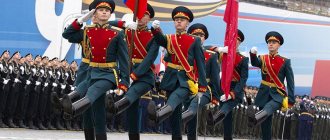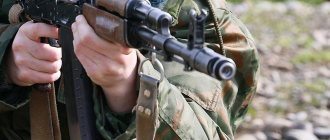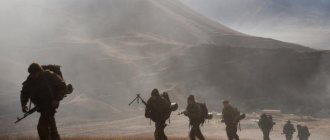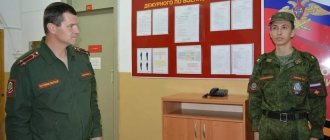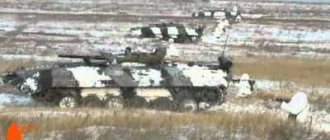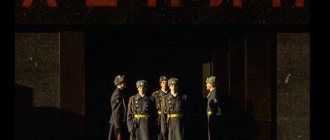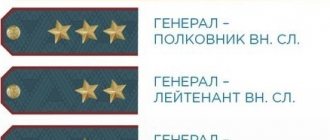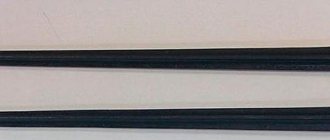What objects should a sentry guard?
Guards in the army directly protect entrusted objects by implementing patrols between the external and internal fences around the protected object or along the fence requiring protection from the inside, if this object has a single fence, as well as by direct observation from towers. Some of the protected objects can be directly guarded by stationary sentries - this is an extremely important requirement to fulfill!
The sentry is according to the person inviolable. The main aspects of the sentry's immunity are as follows:
- in special protection regulated by the legislation of the Russian Federation of his rights and personal dignity;
- the sentry is subordinate to a strictly defined circle of people - the chief of the guard, the immediate assistant to the chief of the guard, and also the guard;
- it is the duty of all civilians to unquestioningly fulfill the requirements of the sentry, which are determined by his service;
- in granting him the legal right to use military weapons in cases specified in the Charter of the garrison and guard services of the Russian Armed Forces.
Only the chief of the guard, the assistant chief of the guard, as well as the guard, to whom the sentry is directly subordinate, have the full right to replace or remove the sentry. No other options are provided!
In the event of a serious illness or injury, the tragic death of the guard commander, his assistant or guard, as well as the physical impossibility of fully performing their duties, the removal or change of the guard will be carried out by the duty officer of the garrison or military unit in the direct presence of the commander of the company, battery or battalion .
The special task of the guard includes the professional protection of military and government facilities; these units must skillfully protect military flags, as well as military personnel located in various disciplinary military units, or military personnel placed in a guardhouse for committing various disciplinary actions. The sentry bears full responsibility for everything that happens at the post during combat duty!
Why is a guard needed in the army?
Guard duty
Designed for reliable protection and defense of military banners, storage facilities with weapons, military equipment, other materiel and other military and government facilities, as well as for the protection of persons held in the guardhouse and in the disciplinary battalion.
Interesting materials:
Why is Intel better than AMD? Why is an IPS matrix better? What's better than a mechanical keyboard? What is the best way to cover the walls on the loggia? Why is alternating current better? Why is an SSD drive better? Why is USB c better? What's the best way to listen to FLAC? What's the best way to play FLAC? What is the best way to seal a cooling radiator?
Who is the sentry: his immunity
The charter of the garrison and guard services of the RF Armed Forces establishes that for the immediate protection and defense of objects, sentries are posted from the guard. The same Charter defines a sentry as an armed guard, performing a combat mission to protect and defend the post assigned to him.
A post means an object designated for direct protection and the surrounding area, equipped with a security alarm and protective structures (fences, barbed wire, watchtowers, firing points, control and trail strip). Security can be carried out inside the fence (if there is a single row arrangement) or between the fences (if there are two of them), with good visibility - from the tower.
As a rule, military personnel from the category of ordinary soldiers (sailors) are appointed as sentries. If their numbers are insufficient, individual guard shifts can be staffed from among sergeants (foremen), while the guard must be of equal or higher rank.
When serving on duty, the sentry is provided with military weapons. The organization of guard duty involves loading weapons according to the rules specified in Article 125 of the Charter, while the cartridge is not loaded into the chamber, the weapon is put on safety. This procedure is carried out before going to posts.
According to the Charter, the sentry must have a weapon with an attached bayonet-knife (bayonet), while an assault rifle with a folding butt - without a bayonet-knife, and a bayonet-knife - in a sheath on the waist belt. The pistol is kept in a buttoned holster attached to the waist belt. An assault rifle with a folding stock is placed in the “chest” position. The carbine is placed against the leg.
At night, the weapon is held in a position from which it is possible to fire from a standing position. The weapon itself must be loaded and ready to fire. In the event of extinguishing a fire or eliminating the consequences of a natural disaster, the sentry is allowed to hold a weapon behind his back.
When serving at a post, a sentry is given a special, very serious legal status, being an inviolable person. Article 204 of the Charter of the Garrison and Guard Services of the RF Armed Forces explains that the immunity of a sentry consists of:
- in the special protection by the legislation of the Russian Federation of his rights and personal dignity;
- in his subordination to strictly defined persons - the chief of the guard, the assistant chief of the guard and his guard;
- it is the duty of all persons to unquestioningly fulfill the requirements of the sentry determined by his service;
- in granting him the right to use weapons in the cases specified in this Charter.
These provisions (including the right to use weapons) are inextricably linked with the goals and functions of the proper performance of guard duty: it is in order for their implementation to be as effective as possible that the sentry is endowed with such broad rights and opportunities. At the same time, the Charter imposes increased responsibility on him. In particular, unauthorized abandonment of a post by a sentry is recognized as a crime against military service, for which, depending on the circumstances, not only disciplinary, but also criminal punishment can be imposed.
Differences
Despite the fact that a sentry is a guard, only when on duty, there are differences between them:
- Firstly, guards can occupy various positions : chief, guard, and assistant. Moreover, everyone has completely different tasks to perform, depending on their specialization. Employees of certain ranks report to employees of higher ranks. Sentinels, when entering service, follow their specific rules , which are listed above.
- Secondly, the sentry is attached to his post and can move exclusively along the specified route . A guard who is not on duty can move within the military unit in any direction.
- Thirdly, the duties of a guard are broader and more varied than the duties of a sentry. This is again due to the availability of more diverse positions within the division.
People serving as guards are responsible for carrying out fundamental military operations: protecting important facilities, protecting and controlling territories. They are very important employees, without whom it would be impossible to carry out many military tasks.
People and societyComment
The main range of rights and responsibilities of the guard
When entering a combat post, the guard must, in the presence of the guard - the chief of the guard or his assistant, as well as the guard being replaced, must personally inspect, check the presence and full serviceability of everything that he must professionally guard and take up defense in accordance with the charter and in cases strictly regulated by law - use weapons. Bases, warehouses of weapons and military equipment, garrisons, barracks, checkpoints - this is only a small part of where the guard must exercise his rights as responsibly as possible, but there are also important restrictions.
A sentry who has taken up his post is strictly prohibited from:
- sit, sleep or close your eyes, under no circumstances lean against anything;
- conduct conversations, write or read, answer questions from any outsiders, with the exception of those persons to whom he is directly subordinate, as well as persons who arrived to carry out an unscheduled inspection;
- It is strictly forbidden to chamber a cartridge into the chamber of the machine gun unless absolutely necessary;
- eat, drink or smoke.
These requirements can be characterized as follows: the sentry is strictly prohibited from performing any actions that may have an important distracting effect on the sentry, which may distract from the professional performance of his immediate duties.
The most important duties of a guard
Taking into account the important specifics of the activity, the guard is obliged to strictly fulfill his duties. These include the following aspects provided for by the military regulations:
- extremely vigilantly and professionally guard and reliably defend the combat post entrusted to him;
- have a constantly loaded weapon and be ready to carry out important actions;
- It is imperative not to be distracted by extraneous things while on duty, in no case to let go of the weapon from one’s hands and be sure not to hand it over to anyone under any pretext - this includes persons who are his immediate superiors;
- carefully and professionally, without losing sight of important details, inspect all available approaches and approaches to the combat post, regularly report on the progress of the service using communication means at the frequency established by the guard service regulations;
- under no false pretext should you dare leave your assigned post until the next guard is relieved or replaced, even if there is any threat to life;
- in no case should you allow absolutely anyone closer to the entrusted combat post than the forbidden line, except your own guard commander, his immediate assistant, his guard, as well as all citizens whom they independently accompany;
- thoroughly and clearly possess all the necessary information about the proposed routes, the schedule of movement of guard vehicles in this area, as well as the presence of important identification symbols or signals;
- be able to quickly and competently use means to extinguish fires that may arise at the post;
- immediately and clearly inform the guardhouse about the activation of technical security equipment or about the unexpected barking of a guard dog, which may indicate an emergency situation.
Prohibitions
Now it’s worth talking about what the guard service regulations prohibit. The sentry is not allowed to do practically anything. He cannot eat, drink, sleep, or smoke while serving. Even leaning against anything is forbidden. Cope with natural needs and talk – even more so. Accepting or transferring any items is also prohibited. He has no right to reload the gun. He can only answer questions from the guard commander or his assistant.
In general, as you can see, a lot of prohibitions have been imposed. So only a person with very strong endurance and patience can occupy the post of guard.
Duties of a guard at a checkpoint and his weapons
The guard at the checkpoint is also obliged to strictly observe the regulations and have full information about the main details of the implementation of the access control regime. The sentry is obliged to let people pass through the post entrusted to him only if citizens have the necessary documents, which are carefully checked for their compliance with the standards established by law and for the identity of the photograph with the bearer of the identity card.
The sentry is obliged to detain persons who attempt to cross the checkpoint without permission, as well as persons who have invalid passes; in this situation, it is obligatory to call the chief of the guard! In addition, the sentry carries out checks on material passes - this kind of check is relevant when carrying out the removal of any military property through a checkpoint. The passage of cars with existing waybills must also be carried out extremely carefully and accurately!
The sentry serving at the checkpoint is strictly prohibited from entering into any conversations with citizens that do not relate to checking the availability of documents and is not obliged to allow the presence of all foreign objects and civilians at the entrusted official post.
Armament of the guard at the post
The sentry is obliged to prevent emergency situations, including with the help of firearms, if he has the necessary grounds for doing so, because his inaction can also lead to unpredictable consequences.
According to the basic provisions of the Charter, the sentry is required to have a serviceable weapon with a bayonet attached to it. At the same time, his machine gun, which is equipped with a folding and convenient butt, does not necessarily have to be equipped with one. The bayonet-knife itself must be on the waist belt in a special sheath.
The charter says that the likelihood of an attack is greatest at night. This can be fully confirmed by the available statistics, so the weapon must be in full combat readiness for the need for its full use if necessary. During the day, it is quite possible to keep the weapon in the same position or put it “on the belt” for comfort.
Upon accepting his post, the guard is obliged to inspect all objects to see if everything was in order at the previous shift. If a discrepancy is found, the sentry must report this to the guard commander so that he can take appropriate measures. It is necessary to take into account that when taking over the post, the sentry is always obliged to hold his machine gun with its wooden butt in the initial position “on the belt”, together with the folding butt - in the position “on the chest”, and the carbine - in the position “to the leg”. Pistols must strictly be secured in a holster on the waist belt, which could guarantee their safety and the ability to quickly remove if necessary!
Responsibilities of the Chief of Guard
Finally, I would like to briefly list them. The chief of the guard is a person who is responsible for the protection and defense of those objects that are entrusted to the guard. He also monitors the combat readiness of the sentries. It is he who is responsible for their service, for how correctly and competently they comply with everything that is entrusted to them. Ammunition, weapons, vehicles and other property are all under his responsibility.
He has the right to demand from the replacement solid knowledge and appropriate performance of all duties. The chief receives weapons, boxes of ammunition, security and communications equipment. He also inspects and checks especially important protected objects, and checks whether this or that equipment is in working order. If the post was attacked or some unforeseen situation occurred there, the consequences of which could be extremely dangerous for the lives of people, guards, sentries and objects, he is obliged to immediately arrive on the spot and begin an operation to eliminate the incident.
The chief sends sentries to posts at strictly specified times and keeps the combat readiness of reserve employees under control. He also carries out the combat crew. At least twice a day he checks how the military personnel are performing their service at the post. And if calls are received from them, he must appear at the place of security of the facility in person. If a malfunction of any kind is detected at the post, the chief is obliged to arrive on site, personally establish the nature of the damage and the reasons why it happened, and then do everything possible to solve the problem.
In general, as you can see, guard duty is an activity that involves bearing enormous responsibility. For people, for objects, for the territory adjacent to them, for weapons, ammunition and much more. So the individuals performing this service are not just military personnel. These are people of the highest endurance, patience and courage.
Moral aspects of guard duty
The sentry bears full responsibility for what is happening, so he must be observant and take into account all related factors. Any weather conditions should not be an obstacle to duty - after all, it is in such weather that the greatest difficulties can arise; in no case should you leave your post, because otherwise you may end up being court-martialed!
At the same time, the sentry must have common sense and, if necessary, warn about the consequences of an unlawful act, because the cause of such a phenomenon can be not only a person, but also a wild animal or bird. Based on the results of his service, he must bring to the attention of the immediate commander all things that might seem strange or deserve closer attention.
Changing the guard at the post
The procedure for changing guards, receiving and handing over a post is a strictly regulated algorithm of actions. In the Charter, this is described in a separate chapter 6, “Divorce and changing of the guards.” The basic procedure is set out in Articles 258-260:
- When the shift approaches the sentry at a distance of 10-15 steps, the leader of the incoming guard commands: “Shift - STOP” and orders one of the guards to observe (when following a shift in a car - load a weapon and watch) the post and the approaches to it. For example: “Private Popov. Take the post and its approaches under temporary supervision.”
- When the shift approaches, the sentry stands facing it and independently takes the machine gun into the “belt” position (the carbine is “towards the leg”).
- At the command of the leading guard, “Private Vasiliev, step to the post - MARCH,” the sentry takes a combat stance, takes a step to the right, the guard approaches the sentry and takes his place, facing in the opposite direction.
- Those who separate the guards being replaced and the intervening ones stand on both sides of the sentry and the guard one or two steps away from them, facing each other.
- At the command of the shifting guard, “Sentry, GIVE UP THE POST,” the sentry makes a verbal surrender of the post. At the same time, the sentry and the guard turn their heads towards each other. The verbal surrender of a post consists of the fact that the sentry, having named the post number, lists to the guard taking over the post everything that is subject to protection according to the post report card, and also indicates what was noticed near the post during his duty.
- Having completed the surrender and acceptance of the post, the sentry and the guard taking over the post stand facing the guard and report in turn. For example: “Comrade Sergeant. Private Petrov passed post number such and such,” “Comrade Senior Sergeant. Private Vasilyev accepted post number such and such.”
Thus, the moment of transition of the guard to the position of a sentry (sentry to the position of a guard) is determined by reports on the acceptance (surrender) of the post. Further, at the command of the guard being relieved (in relation to the above example - “Private Petrov, step from the post - MARCH”, the guard who was relieved stands behind the shift and independently takes the weapon into the “on the belt” position, and the guard, who observed the post and the approaches to it, gets into formation. After this, the leader of the incoming guard commands: “Shift, follow me step by step - MARCH" - and leads the shift to the next post.
When changing internal sentry posts, the guard leading the shift to the entrance to the room commands: “Shift - STOP”, leaves one of the guards as a senior and commands a certain guard of the next shift (one or more): “Follow me step by step - MARCH.” Then, upon entering the room, he changes the guards there according to the standard procedure.
Taking over the post
Article 206 of the Charter of the Garrison and Guard Services of the Armed Forces of the Russian Federation establishes that when taking up a post, the guard must, in the presence of the guard (or the guard chief or his assistant acting in his role) and the guard being replaced, personally inspect, check the presence and serviceability of everything that must be guarded and defended according to the post table. The procedure for these actions is described in more detail in Articles 258 and 259 of the Charter.
After the verbal surrender of the post, the guard, at the command of his guard, “Guard, ACCEPT POST,” is obliged, together with the guard of the incoming guard, in the presence of the sentry and the guard of the changing guard, to walk around the protected object and check the serviceability of lighting, fencing, doors (gates), the condition of windows, bars and walls of storage rooms (warehouses), the presence and condition of locks, cords, seals (seals) and compliance with their casts (impressions) or the number of weapons, military equipment and other military property under protection, as well as the presence and condition of technical security equipment, communications, fire extinguishing and guard clothes. If necessary, the guard taking up the post, with the help of the guard, puts on guard clothes.
If, upon acceptance and delivery of the post, any malfunction is discovered (damage to the fence or seals, seals, locks, cords, doors, windows) or a discrepancy between the seals (seals) and the casts (impressions), as well as the number of weapons, military equipment and other military equipment in the amount indicated in the post report card, the guard stops transferring the post and calls the chief of the guard. When taking over posts by the intervening guard, in such cases the chiefs of the replaced and intervening guard are called.
When can a sentry leave his post?
Article 205 of the Charter of the Garrison and Guard Services of the RF Armed Forces establishes that only his immediate superiors have the right to replace or remove a sentry: the guard chief, the assistant guard chief, and the guard to whom the sentry is subordinate. A situation may arise when all these persons are absent (in the event of their serious illness, injury, death or other physical impossibility for them to perform their duties). Then the unit duty officer (guard) can change the sentry in the presence of the unit commander.
The sentry has no right to leave his post until he is relieved or removed. Otherwise, it is considered as unauthorized abandonment of post - that is, an action that is equivalent to a military crime. In the event of a sudden illness (injury), the sentry, in accordance with the requirements of Article 215 of the Charter, calls the guard or the chief of the guard, continuing to serve.
How long does the sentry stay on duty?
Article 257 of the Charter of the Garrison and Guard Services of the RF Armed Forces establishes that the guards are changed every two hours, at an even or odd hour. In unfavorable climatic conditions (when the air temperature at the post exceeded +30 °C or dropped to minus 20 °C and below, and during windy conditions - even with less frost), the guards are changed after one hour. In these cases, the order to change the duration of the guard's shift is given by the duty officer at the garrison (military commandant's office, military unit).
The change of sentries posted at the entrance to the guardhouse is carried out every 30 minutes by the assistant chief of the guard or the chief of the guard.
Other situations
The above is not all that a sentry must observe. The duties of a sentry also include the need to engage in hand-to-hand combat in order to protect himself and the object he is guarding. He is also obliged to boldly act with either a butt or a bayonet knife.
If a fire breaks out at the post, the sentry must first report this to the guardhouse, continuing to monitor the object and take actions to extinguish the fire.
In a situation where a sentry was wounded or he suddenly felt very unwell, he is obliged to call the guard or the chief of the guard, without stopping his duty. If the incident is urgent (or when the means of communication has become unusable), the sentry can call the relevant persons to the post with a shot upward.
Sentinel rights
The main right of a sentry is his right to immunity while serving at his post. As noted above, the sentry is given the right to use weapons in situations specified by the Charter. But in general, all the expanded rights of a sentry apply only to the post he guards. In addition, they are accompanied by strict requirements and prohibitions designed to ensure the proper performance of their duties by the sentry.
What is prohibited for a sentry on duty?
According to Article 209 of the Charter of the Garrison and Guard Services of the RF Armed Forces, a sentry is prohibited from: sleeping, sitting, leaning against anything, writing, reading, singing, talking, using personal means of communication, eating, drinking, smoking, performing natural needs or otherwise being distracted from performing their duties. In addition, the sentry is prohibited from:
- accept from anyone and transfer to anyone any objects;
- cause by your actions the activation of technical security means;
- unnecessarily send a cartridge into the chamber.
Since May 2022, according to the Decree of the President of the Russian Federation, this list has been supplemented by a ban on the sentry from carrying electronic products in which they can be stored or which allow the distribution or provision of audio, photo, video materials and geolocation data using the Internet.
Article 219 of the Charter additionally states that the guard at the checkpoint is prohibited from giving information about the validity of passes and codes on them, entering into a conversation not related to checking passes, or allowing unauthorized persons or any objects to be at the post.
What is allowed to a sentry on duty?
In fact, the sentry is allowed only actions related to the performance of his official duties, that is, ensuring the security of the post entrusted to him. The sentry has the right to use weapons when:
- attack on one's own person;
- attack on a protected object.
According to the requirements of Article 210 of the Charter of the Garrison and Guard Services of the RF Armed Forces, the sentry must answer questions only from the guard chief, the assistant guard chief, his guard and those who arrived for inspection. Article 216 of the Charter gives the sentry permission in extreme, urgent cases or in the event of a malfunction of communication means to call the guard commander or a guard to the post with a shot in the air.
What is not in the charter
This is not all that a sentry should follow. The duties of a sentry are not only in the charter. They are also specified outside of this document. For example, he must be aware of the access control at his own post and know the security system in every detail. The guard must know what the original passes and other documents look like, their expiration date and other nuances.
He can only let a person through with his own pass. The guard must carefully check the document - not only the photograph, but also the expiration date. If inconsistencies of any kind are noticeable, then the duties and actions of the sentry in this situation allow him to detain this person and call the guard commander for investigation.
The employee is also obliged to stop a vehicle trying to penetrate beyond the borders of the post and demand the presentation of documents permitting passage. If the car has arrived to pick up any property, you need to check the waybill, which clearly states the quantity and name of those items that are to be exported/imported. And, of course, the duties of the sentry of the internal troops include maintaining silence. That is, he should not provide any data, certificates, codes, passes, etc. people arriving at the site.
Actions of a sentry on duty
The sentry at the post, in accordance with the requirements of Article 211 of the Charter of the garrison and guard services of the RF Armed Forces, is obliged to stop all persons approaching the post or the forbidden border of the post, marked on the ground with signs, shouting “Stop, go back” or “Stop, go around to the right (left )". Exceptions for such actions are made only for the chief of the guard, the assistant chief of the guard, his guard and the persons accompanied by them.
In conditions of poor visibility, when from the distance indicated in the post report card it is impossible to identify those approaching the post or the forbidden border of the post, the sentry stops all persons by shouting “Stop, who is coming?” If there is no response and (or) the violator crosses the forbidden border of the post, the sentry warns him with the shout “Stop, I’ll shoot” and detains the violator. The sentry reports the arrest of the violator to the guardhouse, monitors his behavior and, without weakening his attention, continues to guard the post assigned to him.
If the intruder, after the warning “Stop, I’ll shoot,” continues to move, the sentry places a cartridge in the chamber and fires a warning shot upward. If the offender fails to comply with this warning or if he flees, the guard will use a weapon against him.
When the guard’s call is answered: “The guard chief (assistant guard chief, guard) is coming,” the sentry orders: “The guard chief (assistant guard chief, guard), come to me, the rest are in place.” If necessary, the sentry requires that those approaching him illuminate his face. Having made sure that the one who introduced himself is really the chief of the guard (the assistant chief of the guard, the guard), the guard allows him and all the arriving persons to come to him.
If the one who identified himself as the guard chief (assistant guard chief) turns out to be unknown or those with him do not comply with the sentry’s demands to remain in place, the sentry warns the violators with the shout “Stop, I’ll shoot.” If the violators fail to comply with this requirement, the sentry uses a weapon against them.
Article 217 of the Charter of the Garrison and Guard Services provides that the sentry, upon arrival at the post of the commanders to whom he is subordinate, reports to them on the results of his service. For example: “Comrade Lieutenant. No incidents happened while on duty (or something happened).” At the same time, the sentry greets them, as well as the commanders who arrived at the post accompanied by them, according to the rules set out in the Military Regulations of the RF Armed Forces, for which the machine gun from the standing shooting position is first taken “on the belt”, and the carbine - “on the leg”.
The sentry at the post at the Battle Banner performs his duties while in the “at-ease” position. When greeted by military personnel with the Battle Banner, the sentry assumes a drill stance. During the reception of the Battle Banner under guard, the guard is obliged to check the serviceability of the banner case (cabinet) and the seal on it. The guard issues the Battle Banner only on the personal order of the chief of guard and in his presence.
Actions of a sentry during an attack on a post
Article 210 of the Charter of the Garrison and Guard Services not only allows the sentry, but even obliges him to use weapons without warning in the event of an obvious attack on him or the object he is guarding. The same measures are considered acceptable in the case of an immediate threat of attack (physical pressure), when delay in using weapons creates an immediate danger to people’s lives or may entail other grave consequences. At the same time, the use of weapons should not cause harm to the protected object or third parties.
In addition, Article 213 of the Charter, if necessary, engage in hand-to-hand combat to protect oneself or a protected object, allows the sentry to use a bayonet (bayonet) and a butt.
Actions of a sentry in case of fire
According to Article 214 of the Charter of the Garrison and Guard Services, in the event of a fire at the post, the sentry must immediately report it to the guardhouse and, without stopping monitoring the protected object, take measures to extinguish the fire. In the event of a fire in the technical territory of a protected facility or in a facility that has external and internal fences, as well as near the post, he reports this to the guardhouse, continuing to serve at the post.
The duties of the sentry include the requirement to be able to use the fire extinguishing equipment at the post. Also, when extinguishing a fire, the Charter allows the sentry to have a weapon in the “behind his back” position.
If the post at the Battle Banner is in danger (fire or other emergency of a natural or man-made nature), the sentry reports this to the chief of the guard and takes the Battle Banner to a safe place.
Ways of communication
The guard post is a serious place. And this could already be understood from what was described above. It is worth telling a little more about how the sentry addresses certain persons while on duty. For example, if there is poor visibility at the post, and he heard footsteps, then he needs to shout: “Stop, who’s coming?” If no answer is given or the intruder crosses the forbidden border, then the duty of the guard and sentry is to shout the phrase: “Stop, I’ll shoot!” This is followed by the arrest of the person. Then, as mentioned above, the employee reports this to the appropriate point.
If the question is followed by an answer that sounds like: “The chief of the guard (or another position) is coming,” then the sentry must order: “The chief of the guard is coming to me, the rest are in place.” The employee also has every right to demand that the face of a person approaching the post be illuminated. He must verify the identity of the person approaching the protected object. And only after he sees with his own eyes that the person who is suitable is really the one who introduced himself, can he allow everyone who arrived with him to approach him. In these situations, especially when visibility is poor, the sentry must be especially careful. These are the responsibilities.
If the one who identified himself lied, and he is not the chief of the guard, and also ignored the warnings of the employee, then the cry follows: “Stop, I will shoot!” If the requirement is not met, the weapon will be used against the offender.
Final part
The essence of a sentry's service is the armed protection of the territory entrusted to him. For these purposes, the serviceman is endowed with a special right of immunity, and at the same time bears full responsibility for the object entrusted with protection. Therefore, under no circumstances should the sentry leave his post, violate the Charter, or neglect his duties.
But in addition to the Charter, the sentry must also rely on his own common sense. There is always a risk of unforeseen or atypical circumstances and situations arising. Such things must be reported to superiors if they are truly important and pose a potential threat to the safety of the object entrusted with protection.
Already during the first two weeks of service of recruits in the army, professional-psychological selection groups in military units conduct a psychological (psychophysical) examination for the admission of soldiers to guard duty. This work is focused on identifying and preventing military personnel from serving with impaired socio-psychological adaptation and participants in interpersonal conflicts.
Psychologically, guard duty is perceived as quite difficult for many soldiers, especially 18-year-old conscripts. Therefore, appointment to the guard is made from among the most trained and disciplined soldiers who are sufficiently skilled in handling and shooting weapons. It is prohibited to involve military personnel in guard duty:
- those who have not taken the Oath;
- those who have not completed the “young fighter course”;
- being under investigation for their actions;
- sick;
- causing suspicion of a violation of their moral and psychological stability.
In this case, individual qualities, family circumstances, and the presence of signs of deviant behavior of military personnel who may be allowed to perform guard duty must be taken into account.
